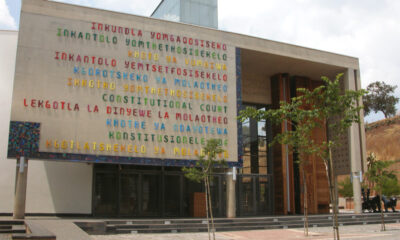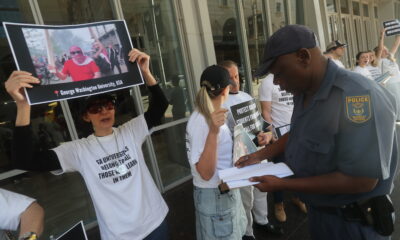
OpEds

BDS’s anti-Israel campaign an abject failure
At the beginning of the present century, a new movement calling itself BDS (Boycott, Divestment, Sanctions) emerged on the international scene. Its core aim is to delegitimise the state of Israel and push for it to be isolated and boycotted by the international community.
A problem those fighting BDS must continually confront is the perception that BDS’s proponents have been able to foster in the public mind. Almost unfailingly, BDS groupings describe themselves as “human rights” organisations, and the mainstream media, certainly in South Africa and no doubt in many other places, uncritically refers to them as such.
By positioning itself in this way, BDS generates the aura of being on the side of all that is just, humane, and progressive. This perception, described by Gerald Steinberg of NGO Monitor as “the halo effect”, routinely results in the claims of self-styled “human rights” groups being accepted with little or no scrutiny, no matter how biased and politicised they might be.
One of its consequences is to imbue BDS activists with a bogus moral authority that helps them to smear those who oppose their agenda or refuse to accede to their demands as being complicit in apartheid, racism, colonialism, and indeed every manner of human rights violation. The stifling effect even the possibility of being so labelled has on the way people behave and express themselves can hardly be under-estimated.
In a great many cases, it can amount to career suicide.
At the same time, BDS groups are never themselves challenged or required to account for their own actions, goals, and ideologically affiliations, which in South Africa include overt hate speech and antisemitism.
One sees from this how even without resorting to the threats, harassment, and violent disruption, for which the movement is deservedly notorious, BDS proponents are frequently able to discourage dissent and enforce their will, whether on institutions or at the personal level.
When confronted with opposition, however, they have shown little compunction in resorting to intimidation to get their way. Often, this doesn’t work.
The past decade has, among other embarrassing BDS fails, included:
- The ignominious failure of its long-running attempted boycott of Woolworths for stocking Israeli products;
- Miss South Africa Lalela Mswane standing up to an unprecedented campaign of bullying, including from certain government ministers, to try to get her to withdraw from participating in the 2021 Miss Universe pageant in Eilat; and
- The 2018 Davis Cup tie between Israel and South Africa going ahead as scheduled in Irene, in spite of hyperbolic threats from BDS and affiliated groups to cause mayhem.
The last example is important considering the Mzansi Challenge-Tel Aviv Heat debacle.
Whereas the mere threat of violence was enough for the South African Rugby Union (SARU) to cave in to BDS’s demands, the South African tennis authorities stood their ground and made appropriate security arrangements. On the day, they were confronted with a mere few score protesters waving flags and shouting slogans at a safe distance from the venue.
That SARU failed to similarly call BDS’s bluff sets a dangerous precedent that could well encourage further such thuggish tactics by BDS exponents and any other fringe protest group seeking disruption.
The primary casualty of it all has been South Africa’s hard-won culture of tolerance and democracy. So far as both Israelis and Palestinians are concerned, it might as well not have existed.
That South Africa, by accident or design, was the birthplace of BDS is significant since the movement explicitly models itself on and is inspired by the global anti-apartheid movement that was instrumental in bringing about the demise of white minority rule.
The case of pre-liberation South Africa is held up as an example of how an unjust regime confronted by no serious military threat from without or within can be brought down by collective moral pressure from the international community.
The BDS movement is driven by the firm belief that the same can be made to happen concerning “apartheid Israel”, hence its single-minded endeavour to affix the “apartheid state” label on the Zionist entity.
Central to BDS’s strategy is appropriating the methods used by the anti-apartheid movement against South Africa by making false and inappropriate analogies between Israel and the apartheid regime. By demonising Israel in this way, BDS seeks to target Zionists as being beyond the moral pale, justifying their harassment and abuse.
Whenever the BDS rhetoric or actions has had an impact on the South African Jewish community, the South African Jewish Board of Deputies (SAJBD) has been at the forefront of confronting this dangerous phenomenon. Indeed, it was only a matter of time before BDS agitators, notwithstanding their routine pious claims to being against Zionism, not Jews, began to target the local Jewish community directly.
It has included aggressively campaigning for Jewish candidates to the Constitutional Court to be ruled out of contention because of their associations with organisations supportive of Israel. It has campaigned for Jewish students at a KwaZulu-Natal university to be “deregistered” and, most recently, for the student representative council at Pretoria University to break all ties with the South African Union of Jewish Students on campus.
How serious a threat does the global BDS movement realistically pose for Israel and world Jewry in general?
With a little more than 20 years having passed since the de facto launch of the movement at the 2001 United Nations World Conference Against Racism in Durban, the answer is that BDS has had zero impact on Israel or Israeli policy.
So far as its core aim of delegitimising the Jewish state and isolating it in the international arena goes, it would appear, in fact, to have been a distinct failure.
Israel has over this century been remarkably successful, not only in strengthening existing ties with other countries – economic, diplomatic, and other – but in forging many new ones. In addition, its economy, a key target of BDS activists, is thriving.
The inability thus far of BDS to make any tangible gains in terms of its core aim of isolating Israel therefore suggests that the movement is going nowhere. Though it has yet to cause any harm to Israel’s objective interests, BDS has nevertheless had an impact on diaspora Jews. It has attempted to force them to give up or hide their historical, religious, and cultural ties to the only Jewish state or face exclusion, bullying, and intimidation. For many Jews, the language and actions of the BDS movement are reminiscent of old Eastern European anti-Jewish tropes, similarly designed to bait, bully, and discomfort Jews for not fitting into the prevailing system of beliefs.
Like all totalitarian systems, BDS and the radical anti-Israel lobby in general are bent on imposing their views in totality, without allowing for the slightest dissent.
Their tactics seem to rely heavily on instilling fear in those who oppose them rather than relying on belief in their cause.
Any “victories” based on such tactics have to be seen as morally bankrupt.
- David Saks is the associate director of the SAJBD.











Jessica
December 3, 2023 at 4:35 am
It goes without saying that by promoting BDS propaganda squads as “human rights” organisations, the mainstream media are, knowingly or not, touting a host of virulently antisemitic “social hustice issues”.
These are manufactured or hijacked without exception by New Leftist, not fascist, gangs.
That’s also why most MSM outlets insist on referring to HAMAS terrorists as “fighters”, “militants”, “soldiers” etc.